OLD TESTAMENT READING: 1 Sam 20:1-21:15
The story of David and Jonathan’s friendship continues. It is an inspiring example of the redemptive value of friendship.
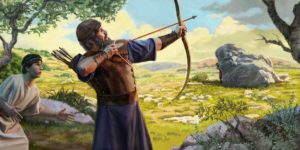 David is benefited in a godly way by this ‘friend who loved him first.’ It is noted that Jonathan loved David as his own soul. This speaks of Jonathan’s selfless concern for David. Jonathan was the heir to the throne, but he recognized that God had signaled David for that position. He joyfully gave up his right to rule in humble surrender to the revealed will of God. He loved the divine influence upon David’s life.
David is benefited in a godly way by this ‘friend who loved him first.’ It is noted that Jonathan loved David as his own soul. This speaks of Jonathan’s selfless concern for David. Jonathan was the heir to the throne, but he recognized that God had signaled David for that position. He joyfully gave up his right to rule in humble surrender to the revealed will of God. He loved the divine influence upon David’s life.
Jonathan is a model of a good friend. He demonstrated a selfless concern for the good of others.
Philippians 2:3-4 (NASB) 3 Do nothing from selfishness or empty conceit, but with humility of mind regard one another as more important than yourselves; 4 do not merely look out for your own personal interests, but also for the interests of others.
When God’s love motivates us, the interests of the loved one take precedence over our own. In divine friendships, we seek the good of the other person at all times.
Proverbs 17:17 (NASB) 17 A friend loves at all times, and a brother is born for adversity.
Both Jonathan and David were blessed to have each other as friends, especially in times of adversity. They looked after each other. They held each other accountable ‘as unto the Lord’ in a covenant bond that spelled out the terms of their relationship (1 Sam 20:15, 18:3). They asked the Lord, the God of Israel, to be their witness to their mutual commitment in friendship (1 Sam 20:12).
It is interesting to note that David stays on a godly course while Jonathan is involved in his life. When Jonathan is no longer involved, we see that David’s weaknesses are played upon by the Tempter, and he goes astray.
Not only does Jonathan look after David, but David looks after Jonathan.
David points out Jonathan’s naiveté in his appraisal of his father, King Saul. His affection for his father blinds Jonathan. He does not recognize that his father is intent on killing David.
Sentimentality blinds us to the depths of human depravity.
Jesus was surrounded by those who pledged to believe in Him. They wanted to make Him king. But Jesus did not allow the enthusiastic support of His fan base to derail Him from obedience to the Father.
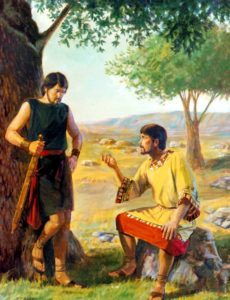 John 2:24-25 (NASB) 24 But Jesus, on His part, was not entrusting Himself to them, for He knew all men, 25 and because He did not need anyone to testify concerning man, for He Himself knew what was in man.
John 2:24-25 (NASB) 24 But Jesus, on His part, was not entrusting Himself to them, for He knew all men, 25 and because He did not need anyone to testify concerning man, for He Himself knew what was in man.
David speaks the truth to Jonathan, in love.
1 Samuel 20:3 (NASB) 3 Yet David vowed again, saying, “Your father knows well that I have found favor in your sight, and he has said, ‘Do not let Jonathan know this, or he will be grieved.’ But truly as the LORD lives and as your soul lives, there is hardly a step between me and death.”
David and Jonathan’s friendship is tested as Saul’s hatred rages against David. David proposes a way for Jonathan to discern the truth about Saul’s intentions. David absents himself from Saul’s table for three days. By the third day, Saul recognizes that Jonathan’s loyalties were to cover for David’s absence. Saul tries to kill Jonathan. With this clear revelation of his father’s murderous intentions, Jonathan warns David to flee for his life.
Once again, David and Jonathan spell out before the Lord their commitment to each other as friends. Jonathan asks that David promise to preserve the lives of his children after David comes to the throne.
1 Samuel 20:14-15 (NASB) 14 “If I am still alive, will you not show me the lovingkindness of the LORD, that I may not die? 15 “You shall not cut off your lovingkindness from my house forever, not even when the LORD cuts off every one of the enemies of David from the face of the earth.”
Saul’s demonically reinforced rage is further manifested in that he curses Jonathan, hurls a spear at him, and demands that he bring David to him. (v.30-33)
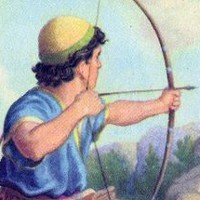 After signaling that David should depart from Saul’s household for safety’s sake by shooting arrows three times beyond the rock where David is hiding, Jonathan and David renew their covenant of friendship, even though it is apparent that David must flee.
After signaling that David should depart from Saul’s household for safety’s sake by shooting arrows three times beyond the rock where David is hiding, Jonathan and David renew their covenant of friendship, even though it is apparent that David must flee.
1 Samuel 20:42 (NASB) 42 Jonathan said to David, “Go in safety, inasmuch as we have sworn to each other in the name of the LORD, saying, ‘The LORD will be between me and you, and between my descendants and your descendants forever.'” Then he rose and departed, while Jonathan went into the city.
David is the chosen King, appointed and anointed by God, yet rejected by men. He flees to Ahimelech in the town of Nob. He and his men are hungry, and there is no bread to eat but the holy showbread at the temple.
David is a foreshadowing of Christ, the Anointed High Priest, and King. The priest, Ahimelech, has the interests of God in heart, submits to the Anointed King (David), and uses the bread for a holy purpose for which it had never been used before- to feed those outside of the priestly line.
Jesus, the Greater David and Greater Ahimelech, would refer to this when he was accused of breaking the Sabbath protocol by plucking and eating corn on the Sabbath.
Matthew 12:2-4 (NASB) 2 But when the Pharisees saw this, they said to Him, “Look, Your disciples do what is not lawful to do on a Sabbath.” 3 But He said to them, “Have you not read what David did when he became hungry, he and his companions, 4 how he entered the house of God, and they ate the consecrated bread, which was not lawful for him to eat nor for those with him, but for the priests alone?
We see that the Christ is the One who fulfills the law. He has the privileges of both Priest and King. He is both the Son of David and the Priest after the order of Melchizedek. And according to the gospel, we who believe are put into Christ, the new temple, and under His administration.
Matthew 12:5-6 (NASB) 5 “Or have you not read in the Law, that on the Sabbath the priests in the temple break the Sabbath and are innocent? 6 “But I say to you that something greater than the temple is here.
In Chapter 21, we see that David’s faith turns to fear. He begins to act foolishly as he considers the threat of Saul rather than the Promise of God.
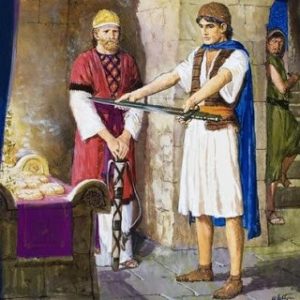 David goes to Ahimelech, the priest at Nob, and lies to him about his situation. His lie is nowhere condoned by God. His lie will lead to the tragic death of 85 priests at the hand of Doeg, the chief of Saul’s shepherds. Doeg witnesses Ahimelech harboring David, equipping him with Goliath’s sword and offering him and his men the consecrated showbread.
David goes to Ahimelech, the priest at Nob, and lies to him about his situation. His lie is nowhere condoned by God. His lie will lead to the tragic death of 85 priests at the hand of Doeg, the chief of Saul’s shepherds. Doeg witnesses Ahimelech harboring David, equipping him with Goliath’s sword and offering him and his men the consecrated showbread.
In fear of Saul, David flees to the enemy, the Philistines. Fear is faith in reverse gear. He seeks the protection of the enemy of Israel, the Philistine King Achish, by pretending to be a madman. There was no need for David to depend on his own wits by pretending to be witless. There is no record of David seeking the will of God in this matter. Now he is playing the role of a fool in the enemy’s camp. (I don’t think Jonathan would have let him resort to this!)
TODAY’S READING FROM THE NEW TESTAMENT
JOHN 9:1-41
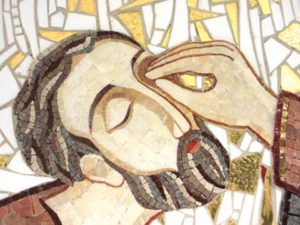 John 9:3-4 (NASB) 3 Jesus answered, “It was neither that this man sinned, nor his parents; but it was so that the works of God might be displayed in him. 4 “We must work the works of Him who sent Me as long as it is day; night is coming when no one can work.
John 9:3-4 (NASB) 3 Jesus answered, “It was neither that this man sinned, nor his parents; but it was so that the works of God might be displayed in him. 4 “We must work the works of Him who sent Me as long as it is day; night is coming when no one can work.
How wonderfully this healing describes the greater work that Christ came to accomplish.
This is the story of a man blind from birth. Jesus discredits the notion that this man’s blindness was due to his sin or the sin of his parents. Instead, Jesus proclaims that his blindness is purposed that the work of God be put on display. And it is not just a work of healing that is put on display, but the work of salvation.
The man is a blind beggar. This describes the desperate, depraved, and deprived state of our birth. We are dead in our trespasses and sins. Jesus sees the blind man. The blind man does not see Jesus. Jesus sees the physical suffering but also the underlying spiritual blindness. The blindness is not particularly due to the man’s sins, or those of his parents, directly; it is due remotely to their ancestor, Adam. As a result of sin, human beings are “darkened in their understanding, excluded from the life of God because of the ignorance that is in them, because of the hardness of their heart.” (Ephesians 4:18). Except he be born again, “he cannot see” (John 3:3).
The healing of the blind was one of the miracles attesting to Jesus being the Messiah (Isaiah 35:6a). In the record of instances in which specific kinds of healings took place in the Gospels, we have one healed who was deaf and dumb, one sick of palsy, one sick of fever, two instances of lepers healed (Matt 8/Mark 1/Luke 5; Luke 17:11) three dead raised, but five cases of healing the blind. The Holy Spirit emphasizes the need for us to have our vision of Who God is restored!
God had a wise and hidden purpose in this man’s affliction. The man would be healed, kicked out of the fold of the bad shepherds (John 9:34), and put into the fold of the Good Shepherd (John Chapter 10).
Notice the powerful symbolism in Jesus’ act of healing. Jesus spat on the dust of the earth and kneaded the dust moistened with the spittle that came out of His mouth. He applied it to the man’s eyes and said, “Go wash in the pool of Siloam.”
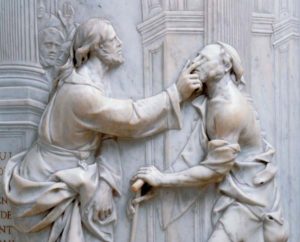 Kneading the mud and healing the blind man were considered violations of the Sabbath rules that prohibited work. Jesus illustrates that He pre-dates the Sabbath and is the author of the Sabbath. He, as the Creator, the second person of the Trinity, made man from the dust. Jesus makes clay from what came out of His mouth- His Word, His breath, symbolizing His Living Word and the Spirit of His life. He, as God, made all things and upholds all things by that which comes out of His mouth- His Word (Colossians 1:16-17; John 1:3; Hebrews 1:3). He gives life to man by that which comes out of His mouth- His Breath, His Spirit, His Word (John 6:63).
Kneading the mud and healing the blind man were considered violations of the Sabbath rules that prohibited work. Jesus illustrates that He pre-dates the Sabbath and is the author of the Sabbath. He, as the Creator, the second person of the Trinity, made man from the dust. Jesus makes clay from what came out of His mouth- His Word, His breath, symbolizing His Living Word and the Spirit of His life. He, as God, made all things and upholds all things by that which comes out of His mouth- His Word (Colossians 1:16-17; John 1:3; Hebrews 1:3). He gives life to man by that which comes out of His mouth- His Breath, His Spirit, His Word (John 6:63).
The man did not cry out for healing. This is a picture of God’s sovereign grace reaching out in love and setting before us Jesus Christ. The application of the clay to the eyes reflects the Holy Spirit impressing upon us our condition as lifeless dust. We are blind. We are lost. We need a Savior.
“Go wash in the pool of Siloam!” We need to be washed. The water is a symbol of the Word in the Bible. “Now are you clean through the Word I have spoken to you.” (John 15:3)
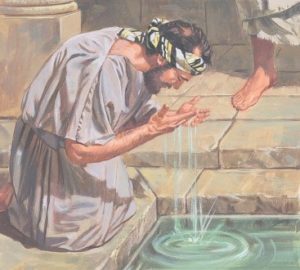 Ephesians 5:25-26 25 Husbands, love your wives, just as Christ also loved the church and gave Himself up for her, 26 so that He might sanctify her, having cleansed her by the washing of water with the word,
Ephesians 5:25-26 25 Husbands, love your wives, just as Christ also loved the church and gave Himself up for her, 26 so that He might sanctify her, having cleansed her by the washing of water with the word,
The Holy Spirit includes the interpretation of the pool’s name: “Siloam.” It means ‘sent.’ When we realize through the Word that Jesus is the One ‘sent’ by the Father for our salvation, confess Jesus as Lord (God), and believe in our heart that God has raised Him from the dead, we shall be saved (Romans 10:9)
John testifies of Jesus:
John 3:34-36 34 “For He whom God has sent speaks the words of God; for He gives the Spirit without measure. 35 The Father loves the Son and has given all things into His hand. 36 He who believes in the Son has eternal life; but he who does not obey the Son will not see life, but the wrath of God abides on him. He who made the clay has the authority to heal the clay. It is right to take care of each other’s needs, even on the Sabbath.”
Have you believed on the “Sent One” of the Father? It will open your eyes!
John 9:5 5 “While I am in the world, I am the Light of the world.”
This is another great illustration of the truth of Psalm 36:9
Psalm 36:9 (NASB) 9 For with You is the fountain of life; In Your light we see light.
Truly, in His light, we shall see light. Jesus is the only light in which we can walk with God and do the work of God. Without Him we can do nothing. We cannot walk or work.
READING FROM THE BOOK OF PSALMS
PSALM 113:1-114:8
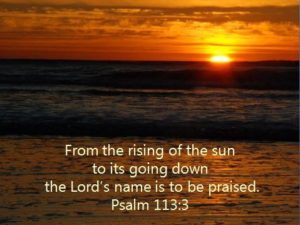 This is the first of the Hallel Psalms (Psalm 113-Psalm 118) that were traditionally sung as pilgrims went up to Jerusalem for the high holidays. According to our understanding of the traditions, Psalms 113-114 were often sung before the meal at Passover, and Psalms 115-118 were sung after the meal.
This is the first of the Hallel Psalms (Psalm 113-Psalm 118) that were traditionally sung as pilgrims went up to Jerusalem for the high holidays. According to our understanding of the traditions, Psalms 113-114 were often sung before the meal at Passover, and Psalms 115-118 were sung after the meal.
“From the rising of the sun to its going down- the Lord’s Name is to be praised!”
The Lord God of Israel is exalted above all the nations. He sits enthroned on high and must humble Himself, stoop down, to behold the heavens and the heavenly creatures. How much more so to look upon us, wayward earthlings? Who can be saved? With God all things are possible! He raises the poor from the dust and seats them with princes. He settles the barren woman in her home as a happy mother of children.
Do you hear the echo in Psalm 113:7 of the prayer of Hannah that we read in 1 Samuel 2?
1 Samuel 2:8 8 “He raises the poor from the dust, He lifts the needy from the ash heap to make them sit with nobles, and inherit a seat of honor; for the pillars of the earth are the LORD’S, and He set the world on them.
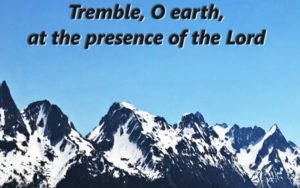 How wonderfully Psalm 114 portrays the power of God’s presence. He has delivered us from the world system, as well as the power of sin and death. He has delivered us from the bondage of our past history in Egypt (the world, where we were subject to the hard taskmasters of sin, and the Pharaoh of this world, Satan). By the power of His presence, the waters of judgment have rolled back as far as the city of Adam, enabling us to go into the land of our promised inheritance. He has turned the rock into a spring of water, the smitten rock of Christ (1 Cor 10:4), the finished work of redemption, into a source of His refreshing life in the Holy Spirit (John 7:38-39).
How wonderfully Psalm 114 portrays the power of God’s presence. He has delivered us from the world system, as well as the power of sin and death. He has delivered us from the bondage of our past history in Egypt (the world, where we were subject to the hard taskmasters of sin, and the Pharaoh of this world, Satan). By the power of His presence, the waters of judgment have rolled back as far as the city of Adam, enabling us to go into the land of our promised inheritance. He has turned the rock into a spring of water, the smitten rock of Christ (1 Cor 10:4), the finished work of redemption, into a source of His refreshing life in the Holy Spirit (John 7:38-39).
READING FROM THE BOOK OF PROVERBS
Proverbs 15:15-17 15 All the days of the afflicted are bad, but a cheerful heart has a continual feast. 16 Better is a little with the fear of the LORD than great treasure and turmoil with it. 17 Better is a dish of vegetables where love is than a fattened ox served with hatred.
These proverbs help us to focus on what is most important.
First, there is the contrast is between the mental attitudes of those whose thoughts are dominated by problems and think of themselves as victims with those who feast on God’s provisions and have peace and joy. Secondly, there is the contrast between a person who can be preoccupied with the material treasures and anxious cares of this world with those who live with a healthy spiritual understanding of Who God is and living according to His Word. Thirdly, it is better to live simply with love, than to be wealthy and successful without love.
Are you getting your priority straight? Seek first the kingdom of God.
PRAYER FOR THE NATIONS
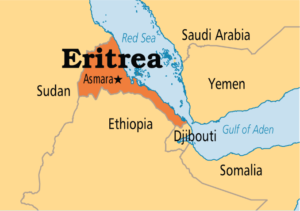 We continue to pray for Eritrea
We continue to pray for Eritrea
RELIGIOUS FREEDOM remains a major issue. A 2002 ruling banned all religious groups from meeting together and practicing their faith without official recognition, and it granted recognition only to Sunni Islam, Eritrean Orthodox, Roman Catholic, and Evangelical Lutheran groups. The effects of this on all Eritreans are significant, especially so on Christians within the Orthodox Church and during the long war with Ethiopia. Pray for government acceptance of religious groups and for restoration of basic human rights and religious freedom to all Eritreans.
The Christian Church faces terrible persecution, both outside the recognized churches and, to some degree, within. Many leaders and lay members are in prison, and more, under house arrest; the government has seized many church assets. Christians are largely Orthodox, mostly from among the Tigrinya, with some from among the Kunama, Bilen, and other peoples. Evangelicals are fewer but are present to varying degrees within most denominations. Christians of all denominations have been refined and drawn together in fellowship through recent decades due to war, drought, and government oppression. But the intense suffering of the church in Eritrea is one of the untold stories of the past decade- a story of tragedy and, ultimately, we pray, a great spiritual harvest. Pray that Christians may remain fervent for Jesus amid hardship and make a significant impact on their nation and beyond.
Evangelicals are growing despite severe persecution. Being officially banned, these groups now operate in underground networks based in homes. Around 20 or more networks are known, but numbers are impossible to ascertain.
PRAYER: Lord, you have demonstrated Your worthiness in Your spectacular creation, Your infallible Word, and Your impeccable righteousness, and consistent faithfulness. Who is like you in holiness? You must stoop down and humble yourself to look upon an angel, to recognize the heavens or the earth. How is it that You would choose to rescue us, the lost sheep, and turn back the waters of judgment in order to bring us home into Your inheritance?
We are grateful that through our faith-union with You, Lord Jesus, our refuge, our Rock, our temple, we are in a safe place, free from the condemnation of the Law. We can partake of You, the Living Bread, without any fear of reproach, even as David partook of the bread that was consecrated only for the priests. Today we choose to live in the light of Who You are and what You have done to make us free. We choose to be filled with the Spirit, with a song of praise cheering our hearts, worshiping You as our greatest treasure. Thank You for the gift of fellowship in the body of Christ. We know that eating paltry vegetables in Your household where Your love is, suits us better and satisfies us more than a T-bone steak where your love is absent!
We pray for the church in Eritrea, lifting up to You their great need for mercy, protection, favor, wisdom, and Your preserving power to continue to spread the good news. May they work Your works in Your light!
Pastor David
